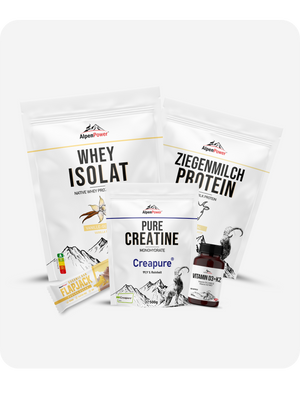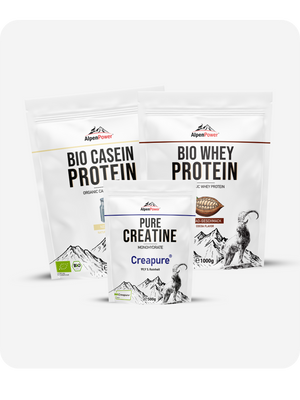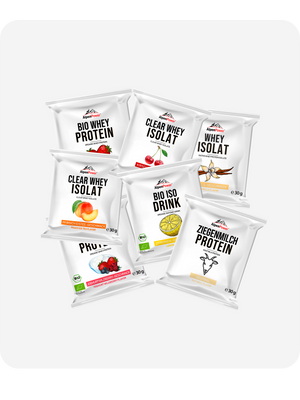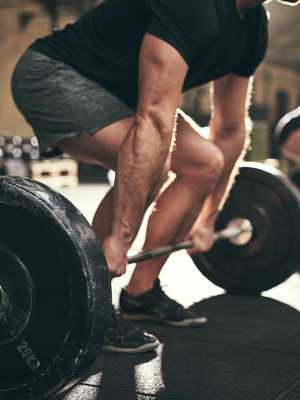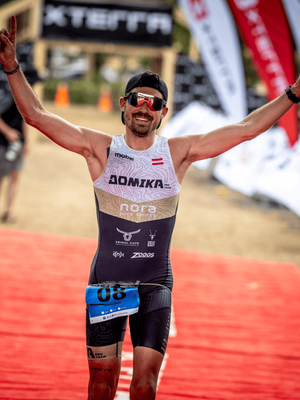Sleep is a fundamental part of human physiology and plays a crucial role in athletic performance and muscular regeneration. Athletes who regularly undergo high-intensity training are particularly dependent on high-quality sleep to regenerate and optimize their physical and mental resources. Today we explain the connection between the neurobiological and physiological mechanisms regarding sleep quality, muscular regeneration and athletic performance. In this context, AlpenPower products, in particular proteins and supplements for sleep optimization, are also presented, which can support regenerative sleep as a helpful supplement.
Neurobiological basics of sleep
Sleep is divided into different phases, in particular the REM (Rapid Eye Movement) and NREM (Non-Rapid Eye Movement) phases, which have different effects on neuronal activity and the endocrine system. During the NREM phases, especially in deep sleep, there is a significant activation of the parasympathetic nerves and a reduction in sympathetic activity, which leads to a stabilization of the cardiovascular system. In addition, the cellular immune system, in particular the activation of T cells, plays a decisive role during sleep. The production and activation of these immune cells occurs predominantly during deep sleep, indicating that adequate sleep is essential for maintaining immune homeostasis.

A critical aspect is the correlation between chronic sleep deprivation and the dysregulation of the hypothalamic-pituitary-adrenal axis, which leads to increased cortisol levels. Chronic sleep deprivation can promote catabolic processes in muscle tissue by negatively influencing protein metabolism and thus hindering muscle regeneration. Increased cortisol levels (cortisol = stress hormone) have been shown to lead to reduced performance and slower cell building processes.
Physiological mechanisms of muscular regeneration
Muscular regeneration is significantly influenced by the duration and quality of deep sleep. During this phase, muscle protein synthesis, an anabolized process in which amino acids are used to repair and grow muscle tissue, takes place to a particularly pronounced degree. Lack of sleep can impair the synthesis of muscle enzymes and proteins, leading to a prolonged recovery time.
In addition, sleep has a significant impact on the hormonal regulatory cycle. In particular, the secretion of anabolic hormones such as testosterone and growth hormones is regulated by the quality of sleep. Studies show that athletes who sleep adequately over a longer period of time have significantly shorter recovery times and make better progress in muscle building. This is due to the increased hormone release during sleep, which supports essential processes of tissue healing and adaptation.
Sleep and athletic performance
The quality of sleep has far-reaching effects on motor and cognitive performance. Good quality sleep not only promotes reaction times, but also cognitive flexibility and executive functions, which has a direct impact on athletic performance. Studies show that athletes who regularly get high-quality sleep have a reduced risk of injury. This is due to the increased alertness and improved coordination that high-quality sleep promotes.
In addition, empirical studies show that endurance and strength performance are closely linked to athletes' sleep patterns. Athletes who are in an optimal sleep environment are able to maintain a higher training intensity and increase their maximum performance. Cognitive and motor performance is significantly supported by the neurophysiological processes that take place during sleep.

Products from AlpenPower to support regeneration
AlpenPower offers a variety of products that specifically support regeneration. Protein shakes play a central role in muscle repair during the night's rest. The provision of essential amino acids during the sleep phase can optimize muscle protein synthesis and significantly shorten recovery times. In addition, supplements such as Magnesium Complex and zinc are of great importance as they stimulate the production of melatonin, which regulates the sleep-wake rhythm. This can significantly improve the quality of sleep. Magnesium has a myorelaxant effect, which promotes muscle relaxation. Experience reports from athletes show that the combination of these products can bring about significant improvements in sleep quality and thus in regeneration. Organic CBD oil can also have an equally beneficial effect. CBD oil (cannabidiol) has been shown in research to have potential benefits for sleep quality, with several mechanisms identified. Firstly, CBD has anxiolytic properties that support the reduction of anxiety and stress, promoting a more relaxed state of mind. In addition, CBD modulates sleep architecture, particularly the REM phase, and can prolong total sleep time and reduce nocturnal wakefulness. Its analgesic and anti-inflammatory effects help to relieve pain and reduce chronic inflammation, which is often associated with sleep disorders. CBD also interacts with the endocannabinoid system, which plays a crucial role in regulating sleep, mood and stress. In summary, empirical findings show that CBD oil can significantly improve subjective sleep quality by shortening the time it takes to fall asleep and increasing overall sleep satisfaction.
Practical recommendations for athletes
To optimize recovery through sleep, athletes should follow some basic principles of sleep hygiene. These include establishing regular sleep times, a relaxing evening routine and minimizing screen time before bed. Combining sleep hygiene with the use of supplements, such as AlpenPower products, can further improve sleep quality and therefore have a positive impact on athletic performance. In the long term, improved sleep quality not only influences muscle growth, but also general athletic endurance and performance. The implementation of structured sleep strategies and the use of targeted nutritional supplements can be decisive for athletic success and improved regeneration.

Conclusion
In summary, it can be said that both neurobiological and physiological findings underpin the central role of sleep for muscular regeneration and athletic performance. High-quality nutritional supplements such as AlpenPower products can help to improve sleep quality and promote regeneration. Future research and studies in sports science will continue to provide new insights into the influence of sleep on athletic performance, providing valuable information for athletes and coaches.
Sources
Magnesium and recovery: https://pubmed.ncbi.nlm.nih.gov/33009349/ CBD:https://pmc.ncbi.nlm.nih.gov/articles/PMC8369499/ Sleep phases: https://www.healthline.com/health/healthy-sleep/stages-of-sleep Protein and sleep: https://pubmed.ncbi.nlm.nih.gov/36083207/ Neurological basics: https://pmc.ncbi.nlm.nih.gov/articles/PMC6230548/ Sleep and athletic performance: https://pmc.ncbi.nlm.nih.gov/articles/PMC9960533/ Sleep and strength: https://pubmed.ncbi.nlm.nih.gov/29422383/
